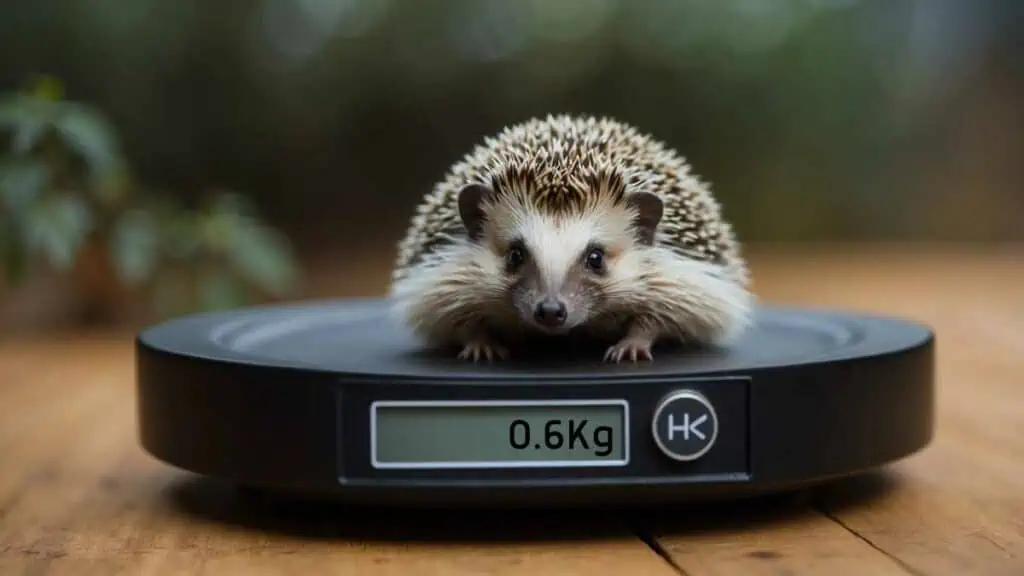Have you ever wondered just how much a tiny hedgehog weighs?
These adorable creatures, despite their small size, have specific weight ranges that are key indicators of their health. We’re about to delve into the fascinating world of hedgehog sizes, from the petite African pygmy hedgehog to the slightly larger European variety.
We will discuss how factors like diet, environment, and health conditions can influence their weight. Plus, we’ll explore why hedgehog owners must monitor their pet’s weight and body shape, ensuring they maintain a healthy balance. Ready to uncover the tiny scales of hedgehog sizes?

A healthy adult African Pygmy hedgehog typically weighs between 450 and 650 grams. Factors influencing their weight include diet, environment, and health conditions. Regular monitoring and an ideal weight range are crucial for hedgehog health management.
How Much Should a Hedgehog Weigh?
Understanding the weight of hedgehogs is essential for ensuring their health and well-being. These charming little creatures typically have a weight range indicative of their general health status.
A healthy adult pigmy hedgehog generally weighs between 300 and 700 grams. Factors influencing their weight include diet, environment, and underlying health conditions.
It is important to monitor the weight of a hedgehog as both underweight and overweight can be signs of health issues.
Hedgehog owners should observe their pet’s body shape and size, which are good health indicators. A hedgehog should be able to fully curl into a ball without showing its belly, and when viewed from above, this shape should either resemble a water drop or appear straight.
Regular weighing can help track changes in their weight, but it’s important to consider that variations may occur due to gender, age, and seasonal changes.
Understanding Hedgehog Weights
When considering hedgehog weights, awareness of age-related averages, influential factors, and health implications is essential for pet owners to maintain their hedgehogs in optimal condition.
Average Weights by Age and Size
Hoglets, or baby hedgehogs, are born quite small, but their growth is rapid. They can weigh 10-25 grams in the first weeks of life.
As they transition into adulthood, the average European hedgehog typically weighs between 800 grams to 1.2 kg (1.76 to 2.65 pounds), while the smaller African pygmy hedgehog, commonly kept as a pet, weighs between 250 to 600 grams.
| Age Group | Average Weight |
|---|---|
| Hoglets (Birth) | 10-25 grams |
| Juvenile | 150-300 grams |
| Adult (European) | 800g – 1.2 kg |
| Adult (African Pygmy) | 250-600 grams |
Factors Influencing Weight
A hedgehog’s weight can be determined by various factors such as genetics, breed, diet, and environment. Nutrition is crucial; a diet that mimics their natural insect-based diet promotes a healthy weight.
Hibernation can also play a role, especially in wild species like the European hedgehog, which may lose up to one-third of their body weight during this period.
Health and Ideal Weights
A healthy adult hedgehog should weigh within a specific range to avoid health issues. Overweight and underweight hedgehogs may suffer from health issues such as fatty liver disease or malnutrition, respectively.
An ideal weight for an adult African pygmy hedgehog, the species most commonly kept as pets, is generally between 450 to 650 grams. Regular weight checks can help detect deviations early and adjust care, such as diet and exercise.
| Condition | Weight Impact | Health Impact |
|---|---|---|
| Healthy Adult | 450-650 grams | Optimal |
| Underweight Hedgehog | Below Range | Malnutrition Risk |
| Overweight Hedgehog | Above Range | Obesity Issues |
Caring for Your Hedgehog

Caring for a pet hedgehog requires attention to their nutritional needs and an environment conducive to their active lifestyle. Proper diet and exercise are pivotal for maintaining their health, and these factors can prevent common issues like obesity.
Proper Nutrition and Diet
Hedgehogs are naturally insectivores, so protein is essential to their diet. A balanced diet for a pet hedgehog can include specially formulated hedgehog food or high-quality cat food supplemented with various insects like crickets and mealworms.
Feeding an African pygmy hedgehog, one of the most common pet breeds involves:
- Insects: Live or dried as a natural source of protein.
- Cat Food: As a staple, it should be low in fat and high in protein.
- Treats: Occasional fruits or cooked eggs, but in moderation to avoid weight gain.
- Clean Water: Always available in a dish for easy access.
It’s vital to avoid foods high in fat and sugar, as they can lead to health issues and obesity.
Exercise and Lifestyle
Hedgehogs are naturally active and nocturnal animals that enjoy foraging and exploring. To cater to this behavior:
- Provide a spacious cage with enough room for movement.
- Include toys and tunnels for play and exercise.
- Arrange a running wheel for nightly activity, which helps prevent weight gain.
- Incorporate hiding spots to mimic foraging conditions and support mental stimulation.
A combination of a well-structured habitat and regular opportunities to explore outside their cage under supervision can encourage natural behaviors and contribute to a healthy lifestyle.
Regular veterinary check-ups are essential to monitor their weight and overall health. Keeping their living environment clean helps prevent diseases and supports well-being.



Leave a Reply